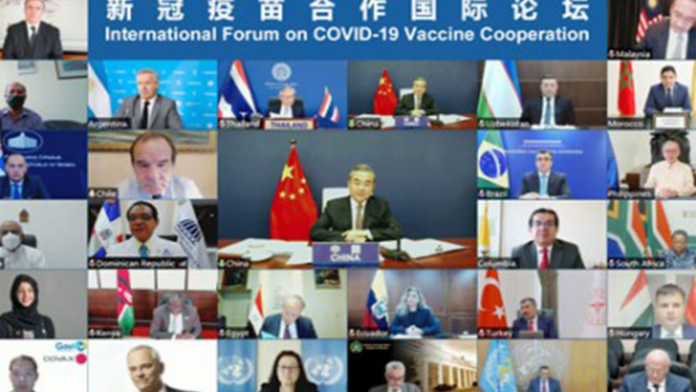Twenty-three countries, including the Philippines, called on the international community to reject vaccine nationalism and enhance cooperation mechanisms and collaboration to boost the fight against the pandemic that is worsened by emerging and more transmissible variants.
On August 5, China hosted the International Forum on Covid-19 Vaccine Cooperation jointly launched by Argentina, Brazil, Chile, Colombia, the Dominican Republic, Ecuador, Egypt, Hungary, Indonesia, Kenya, Malaysia, Mexico, Morocco, Pakistan, the Philippines, Serbia, South Africa, Sri Lanka, Thailand, Turkey, the United Arab Emirates, and Uzbekistan.
In a joint statement released by the Chinese Foreign Ministry on Friday, the group underscored the importance of vaccine multilateralism, noting that solidarity and cooperation are key to fighting the virus that causes the coronavirus disease 2019 (Covid-19).
“We must champion the vision of building a global community of health for all, put people and their lives first, and make concerted and coordinated efforts to address the challenge,” it read.
As a global public good, the group of countries said, all relevant parties must step up efforts to make vaccines more accessible and affordable in developing countries.
“We underline the importance of vaccine multilateralism and call upon countries to enhance international cooperation mechanisms and collaboration, reject vaccine nationalism, lift export restrictions on relevant vaccines and raw materials, support enhanced cooperation on vaccine research and development, production, equitable distribution, and ensure cross-border flows of vaccines,” it added.
They also called on nations to increase production and capacities, and carry out vaccine research and development.
Among others, they encouraged capable vaccine-producing countries to provide more jabs to the COVAX Facility; and for multilateral financial institutions and other international organizations to extend inclusive financial support for vaccine procurement and strengthening of production capabilities in developing countries.
‘Strengthen collective action’
Foreign Affairs Secretary Teodoro Locsin Jr., who represented the Philippines at the forum, said the country recognizes that Covid-19 vaccines “should be made available to all, rich and poor countries alike,” the reason why it has already contributed a total of USD1.1 million to the COVAX Facility.
Locsin noted that about four billion doses have been administered worldwide but the rate of vaccination is 30 times more in countries with the highest incomes than in countries with the lowest.
“In the Philippines, we have administered only 20 million doses for a population of more than 90 million qualified to take. We know the reason is not because we have many anti-vaxxers. We just don’t have enough vaccines,” he said.
Citing the need to speed up vaccine production worldwide, Locsin noted that countries should adopt the World Trade Organization’s proposal to waive intellectual property protections on Covid-19 jabs.
“In an increasingly likely future of regular booster shots for Covid, like we’ve done for the common flu, strategically dispersed local production of vaccines is a lifeline and a net cast faster, farther, and wider than any alternative strategy,” he said.
In addition, Locsin emphasized the need to facilitate the movement of vaccinated people across borders without discrimination based on the brand he/she received.
“All vaccines work – with some people as effectively as any vaccines that came later with the benefit of hindsight. Otherwise, it is discrimination against developing countries who got what was first on offer and what they could afford,” he said. (PNA)


